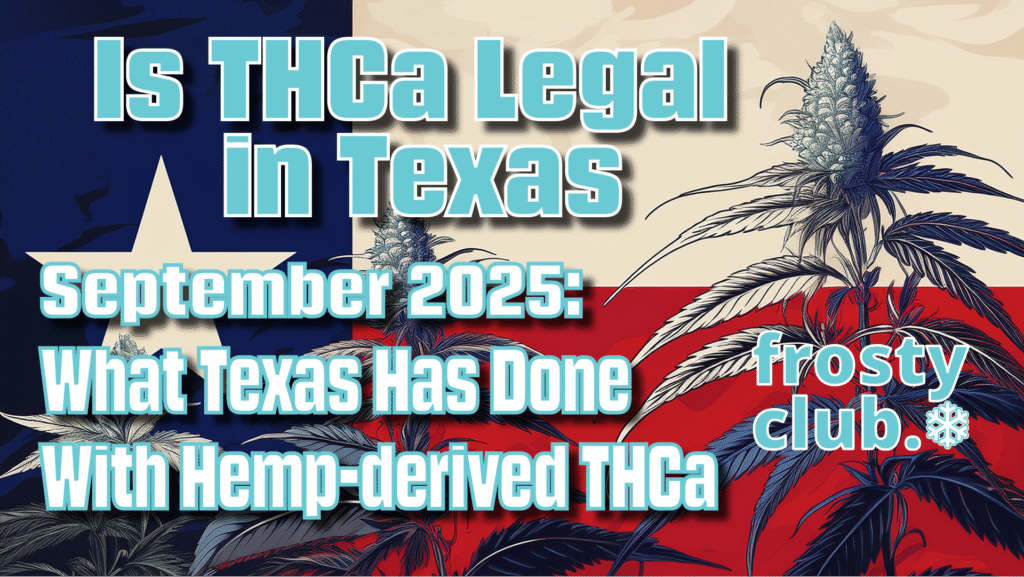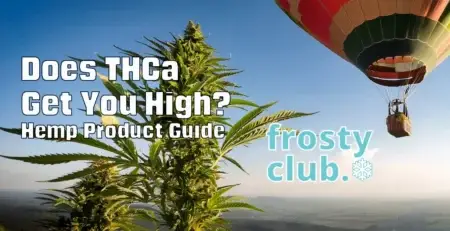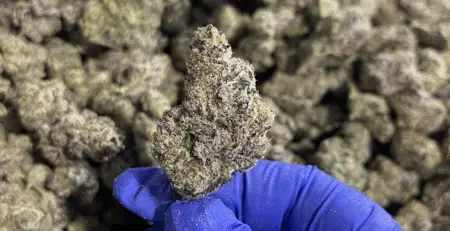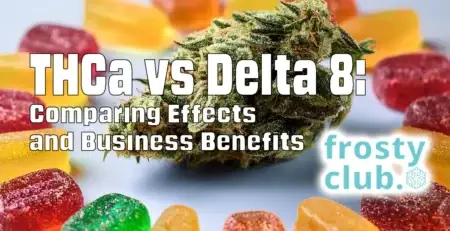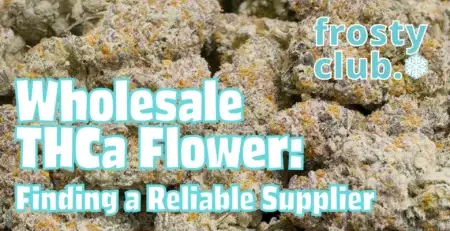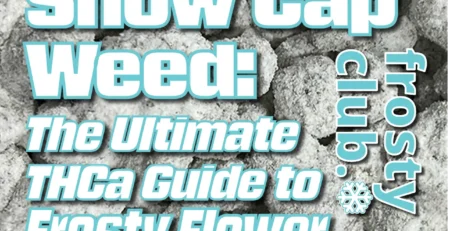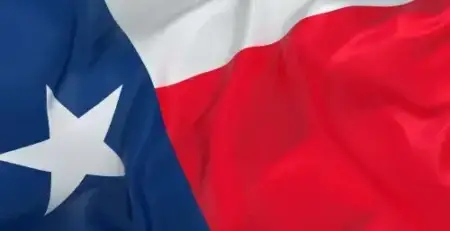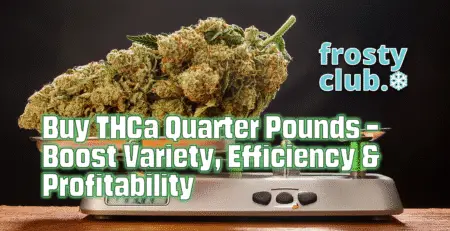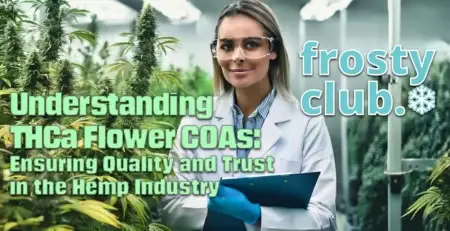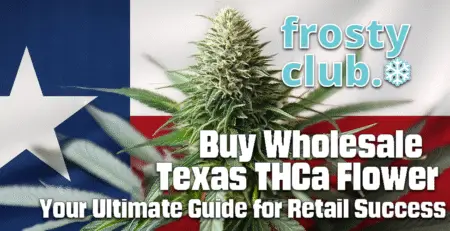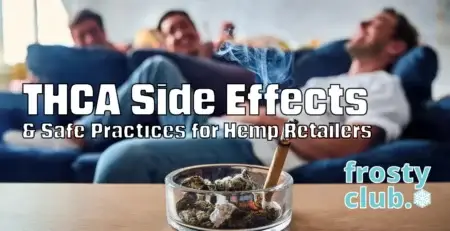Is THCa Legal in Texas: September 2025: What Texas Has Done With Hemp-derived THC
There’s been a lot of news about THCa legislation in Texas. Since it’s fresh in the news cycle, let’s dive in to see how it affects your business. But, don’t worry (SPOLIER!) it’s not bad news for legitimate companies like Frosty Club and its partner customers.
Remember- 24 hours is a long time in politics. So weeks-to-months of back-and-forth will create opportunities to advocate for your business! And, we will keep you informed with the most up-to-date information not only as a service to our customers, but also as a service to yours.
Diving deep: THCa in Texas
This Frosty Club Guide does a deep dive on legal changes, including a timeline of events and how these changes affect your business. We can help answer the common questions you’re hearing, “Is THCa legal in Texas,” and “Is CBD banned in Texas?”
Table of Contents
- Key Terms
- Timeline of Events & Legislative Actions
- What Is in the Executive Order & Proposed Regulation
- Current Status (What Laws / Rules Are In Effect)
- The Role of THCa
- Gov. Abbott vs Lt. Gov Dan Patrick & Legislative Dynamics
- Legal & Economic Impacts / Concerns
- What Still Is Unclear / Next Steps
- Bottom-Line: Where Things Stand Now
- Legislation Texts and Resources
- Texas Hemp Advocacy / Industry Groups
- Suggested Action Plan (How to Engage)
- National Advocacy & Industry Groups
- Texas-Specific Advocacy & Trade Groups
- Business / Legal Coalitions

What Is in the Executive Order & Proposed Regulation
From the reports in the news the week of September 7, 2025:
- Sales of hemp-derived intoxicating cannabinoid products only to those 21 years of age or older. (Buchanan Ingersoll & Rooney)
- Require age verification (government ID) at point of sale. (Cannabis Business Times)
- Strengthening testing and labeling requirements. Including declaring “total THC” (which counts both delta-9 THC plus THCa that may convert under heat) in tests.
- Increase licensing fees to enable better enforcement; better record-keeping.
- Potential penalties / loss of retailer’s license if selling to minors.
Current Status of THCa (What Laws / Rules Are In Effect)
Here are some important notes you can share with customers who are curious:
- SB 2024 is in effect (as of Sept 1, 2025) banning many vape-type cannabinoid products / restricting their marketing/forms.
- Executive order (Sept 10) is underway: agencies are tasked with rulemaking and enforcement changes. Not all parts are immediate law, but rule changes will set binding regulation.
- SB 3 (the broad ban) was vetoed; SB 5 did not pass the House; so far no full ban implemented except in limited forms (e.g., vaping under SB 2024).
The Role of THCa
- THCa (tetrahydrocannabinolic acid) is a precursor that can convert to delta-9 THC when heated (e.g. by smoking/vaping). Some legal/regulatory proposals count THCa toward “total THC” in determining whether a product is intoxicating.
- Under the proposed / ordered testing changes, tests will include THCa in the total THC calculation. That could mean many products currently sold that have THCa (flower, vapes, etc.) may exceed legal limits under the new approach.
Gov. Abbott vs Lt. Gov Dan Patrick & Legislative Dynamics
- Lt. Gov Dan Patrick has been pushing tougher, often outright bans. He sponsored/led SB 3, SB 5, etc. He wants strong prohibition/regulation to protect children/public health.
- Governor Abbott has taken a more regulatory-rather-than-prohibitionist stance: he vetoed SB 3, calling for regulation, not criminalization of hemp products; issued executive orders to regulate; seems more cautious about constitutional, economic, enforcement, and unintended consequences.
- The Texas House has generally been more reluctant to pass full bans; it has stalled many of the Senate’s prohibitionist bills, particularly SB 5 etc.
Legal & Economic Impacts / Concerns for Cannabis
- Industry / businesses: There are many hemp retailers, product makers who could be impacted if bans are enforced; concerns about shutting down businesses, loss of jobs, investments.
- Consumers, including veterans, people using hemp-derived cannabinoids for therapeutic purposes, worry that bans/regulation will restrict access.
- Legal challenges are likely: Some argue SB3, SB5 etc. may face constitutional challenges (Commerce clause, due process), and Abbott has cited judicial risks.
- Regulatory burden / enforcement: IDs, testing, labeling, licensing, packaging — these create costs. For smaller vendors, cost of compliance may be high.
What Still Is Unclear about THCa in Texas / Next Steps
- The exact thresholds that will be adopted in rules for “total THC” including THCa. What potency limits, how to measure, allowable serving sizes remains to be finalized.
- How much enforcement (and how aggressively) across counties / cities will happen; what penalties will be in place.
- How products already on shelves will be handled, especially THCa flower or extracts, or stores importing from elsewhere.
- Whether any lawsuits will successfully block parts of the new rules or laws.
- Whether Texas will revisit legislation in the next regular session (2027), possibly pushing more reforms or bans.
Bottom-Line of THCa in Texas: Where Things Stand Now
- Hemp products with intoxication potential (THC / THCa) are not totally banned in Texas yet, but regulation is tightening significantly.
- Some categories (especially certain vape products) are already restricted via SB 2024.
- Governor Abbott’s executive order has set a new direction: age restrictions (21+), ID verification, more testing/labeling, etc.
- There is a tug-of-war: Lt. Gov and Senate pushing for bans; Abbott more for regulation.
Texas THCa / Hemp-Derived Goods Timeline
- 2019 — Texas passes HB 1325, legalizing hemp (? 0.3% delta-9 THC), opening the door for CBD and other cannabinoids.
- 2021–2024 — Delta-8, THCa, and other hemp-derived products surge in popularity; legal battles begin over regulation vs prohibition.
- Early 2025 — Senate Bill 3 (SB 3) introduced to ban all consumable hemp products with any detectable THC. Passes legislature.
- June 22, 2025 — Gov. Greg Abbott vetoes SB 3, rejecting an outright ban and calling for regulation instead.
- July 21, 2025 — Abbott calls a special session, listing hemp/THC regulation as an agenda item.
- Late July 2025 — Senate passes SB 5, another attempted ban. The House blocks it.
- August 2025 — SB 2024 signed into law: bans many hemp vape products, especially youth-oriented designs. Takes effect Sept 1, 2025.
- September 1, 2025 — SB 2024 effective: restrictions on cannabinoid vape sales/marketing.
- September 10, 2025 — Abbott issues executive order:
- Hemp THC products limited to 21+ only
- ID checks required
- Stronger testing & labeling (total THC, including THCa)
- Higher licensing fees & stricter record-keeping
- Hemp THC products limited to 21+ only
Legislation Texts and Resources
| Legislation | Description | Link to Full Text |
| SB 3 (2025-2026, 89th Legislature) — “Relating to the regulation of products derived from hemp, including consumable hemp products and the hemp-derived cannabinoids contained in those products.” | This is the broad bill that would have banned many consumable hemp products with cannabinoids other than CBD or CBG, required licensing, etc. The bill was vetoed by Governor Abbott. (Texas Legislature Online) | SB 3 introduced version (HTML) (Texas Legislature Online) LegiScan version (enrolled / full text) (LegiScan) |
| SB 2024 — “Prohibition on marketing, advertising, offering for sale, or selling certain e-cigarette products; increasing criminal penalties; etc.” | This law restricts vape / e-cigarette products, especially those containing or marketed as containing cannabinoids, whether or not nicotine is present. It also bans certain product forms, packaging/advertising targeting minors, etc. It is in effect as of Sept 1, 2025. (Texas Legislature Online) | SB 2024 full text (Enrolled version) (Texas Legislature Online) SB 2024 bill text on LegiScan (Engrossed) (LegiScan) |
Texas Hemp Advocacy / Industry Groups
| Name | What They Do / Why They Matter | Contact Information | How to Get Involved / What They’re Doing Now |
| Texas Hemp Coalition | One of the leading nonprofit organizations defending hemp at every stage (farming, processing, retail). Major role in opposing bans like SB 3 / SB 5; organizing lobbying, education, public awareness. (Texas Hemp Coalition) | Contact form on website: “Contact The Texas Hemp Coalition” via texashempcoalition.org. (Texas Hemp Coalition) | – Join as member or advocate (they offer membership tiers). (Texas Hemp Coalition) – Use their “Take Action” / “Legislative” tools to contact lawmakers. – Follow their newsletters, attend their events/webinars. – Help with letter writing, public comment when rules are under review. |
| Texas Hemp Business Council | Represents the business side: retailers, processors, etc. They publish economic reports, alert businesses about legislation (e.g. SB 2024), help with regulatory compliance, try to frame regulatory reform rather than bans. (Texas Hemp Business Council) | Email: [email protected] Based in Austin, TX. (Texas Hemp Business Council) | – Join as a member to receive legislative updates. – Use their resources for tracking bills, preparing for compliance (labelling, packaging, licensing). – Amplify their alerts (share with lawmakers, public). |
| Texas Hemp Growers Association | Focuses on hemp farmers / growers: cultivation support; business networking; advocating for favorable agricultural / regulatory policies. (HempTX) | They have a directory, website; however I didn’t find a direct email in the search results (public directory functions). (HempTX) | – Become a member to get listed in directory. – Attend grower / farm-focused meetings or webinars. – Participate in shaping rule comments related to cultivation / farm registration / testing thresholds. |
| Texas Department of Agriculture – Hemp Program | While it’s a regulator rather than advocacy, it’s very important to engage with. They oversee licensing, crop lot permits, lab testing, etc. Advocates need to understand their rules, provide feedback. (Texas Agriculture) | Hemp Contact Information: email [email protected] Phone for hemp program questions: 979-542-3691; for licensing: 512-936-4176. (Texas Agriculture) | – Submit feedback during rule review periods. – Engage for clarity on “total THC / THCa” measurement, lab accreditation, etc. – Understand licensing processes and help inform members of your organization. |
| Texas Hemp Industries Association (via the national Hemp Industries Association, state resources) | They offer educational materials, state hemp info, advocacy & legal resources. Can be a bridge for smaller businesses to national strategy & legal protection. (The HIA) | The state hemp program page: [email protected], phone 512-463-8215 (for certain state hemp program info) via HIA resources. (The HIA) | – Become affiliated or partner for broader legal / regulatory strategy. – Use their toolkits / state law summaries. – Possibly coordinate via joint letters or amicus briefs if legal challenges arise. |
Suggested Action Plan (How to Engage)
- Reach Out / Join
Pick one or more of these groups and become a member, or at least subscribe to their newsletter / alerts. For example, Texas Hemp Coalition has membership / advocate supporter levels. (Texas Hemp Coalition) - Public Comments / Rulemaking
Whenever the state (e.g. DSHS, TDA) issues proposals for rules (e.g. defining “total THC,” lab test standards, licensing fees), write public comments. Use the contact points listed above. Show up for public hearings if there are any. - Contact Legislators
Use resources from the advocacy groups (they often provide “email your legislator” tools) to send personalized messages to your local state representative and senator. Focus on: requiring age limits, labeling, not banning entire classes of hemp products. - Business-level Preparedness
If you’re part of a business (grower, retailer, processor), get clarity on licensing / testing / labeling now. Make sure you understand what “total THC including THCa” means under current or proposed rules. Join trade groups to pool resources. - Network / Visibility
Attend hemp-industry events, webinars, meetings organized by these groups. Share your story: how regulation vs ban affects your business / community. This helps advocacy groups have real data and personal narratives when talking to the legislature.
Here’s a strong list of advocacy groups and industry associations that support hemp, hemp-derived cannabinoids (including THCa, Delta-8, Delta-9 compliant, etc.), and hemp businesses. These are the organizations that usually file lawsuits, lobby legislatures, or provide resources to keep hemp legal and regulated rather than banned.
National Advocacy & Industry Groups
- U.S. Hemp Roundtable — Leading national coalition of hemp companies, brands, and associations. Very active in lobbying Congress and statehouses to protect hemp and hemp-derived cannabinoids.
hempsupporter.com - National Hemp Association (NHA) — Grassroots membership-based advocacy group focused on hemp cultivation, processing, and product development, including cannabinoids.
nationalhempassociation.org - Hemp Industries Association (HIA) — Longstanding trade association for hemp businesses and advocates; frequently involved in lawsuits to protect hemp commerce.
thehia.org - Americans for Safe Access (ASA) — While originally focused on medical cannabis, ASA supports access to hemp-derived cannabinoids as part of the broader plant-based medicine movement.
safeaccessnow.org - NORML (National Organization for the Reform of Marijuana Laws) — While cannabis-focused, NORML advocates against bans on hemp cannabinoids and supports consumer access.
norml.org - Veterans Cannabis Project (VCP) — Advocates for veterans’ access to cannabis and hemp-derived cannabinoid therapies.
vetscp.org
Texas-Specific Advocacy & Trade Groups
- Texas Hemp Coalition — The largest Texas-based hemp trade group, formed to protect hemp farmers, processors, retailers, and cannabinoid product manufacturers. They’ve been heavily involved in opposing SB 3 and other prohibitionist bills.
texashempcoalition.org - Texas Hemp Growers — Focused on supporting hemp farmers and businesses across the state; active in legislative advocacy.
texashempgrowers.com - Texas Hemp Federation — Advocacy group promoting hemp industry opportunities, education, and policy engagement in Texas.
texashempfederation.com - Texas NORML — The Texas chapter of NORML, actively mobilizing against hemp bans and for broader cannabis reform.
texasnorml.org
Business / Legal Coalitions
- Council for Federal Cannabis Regulation (CFCR) — Works at the federal level to encourage sensible regulation of hemp and cannabis.
uscfcr.org - American Trade Association for Cannabis and Hemp (ATACH) — Represents businesses in the cannabis and hemp sectors, focused on policy, compliance, and lobbying.
atach.org - NCIA (National Cannabis Industry Association) — Broader cannabis industry association, but includes hemp-derived cannabinoid businesses as members and advocates against bans.
thecannabisindustry.org
